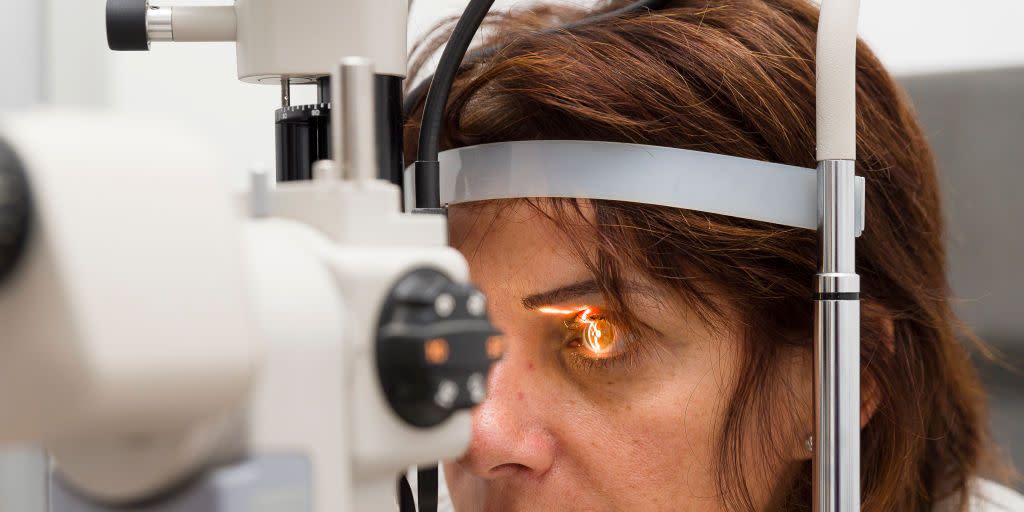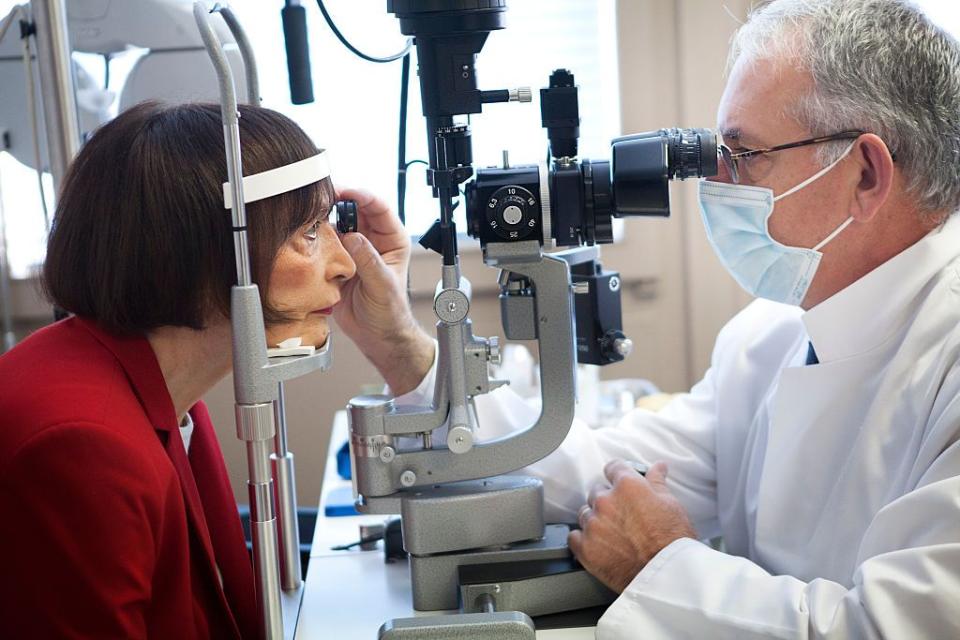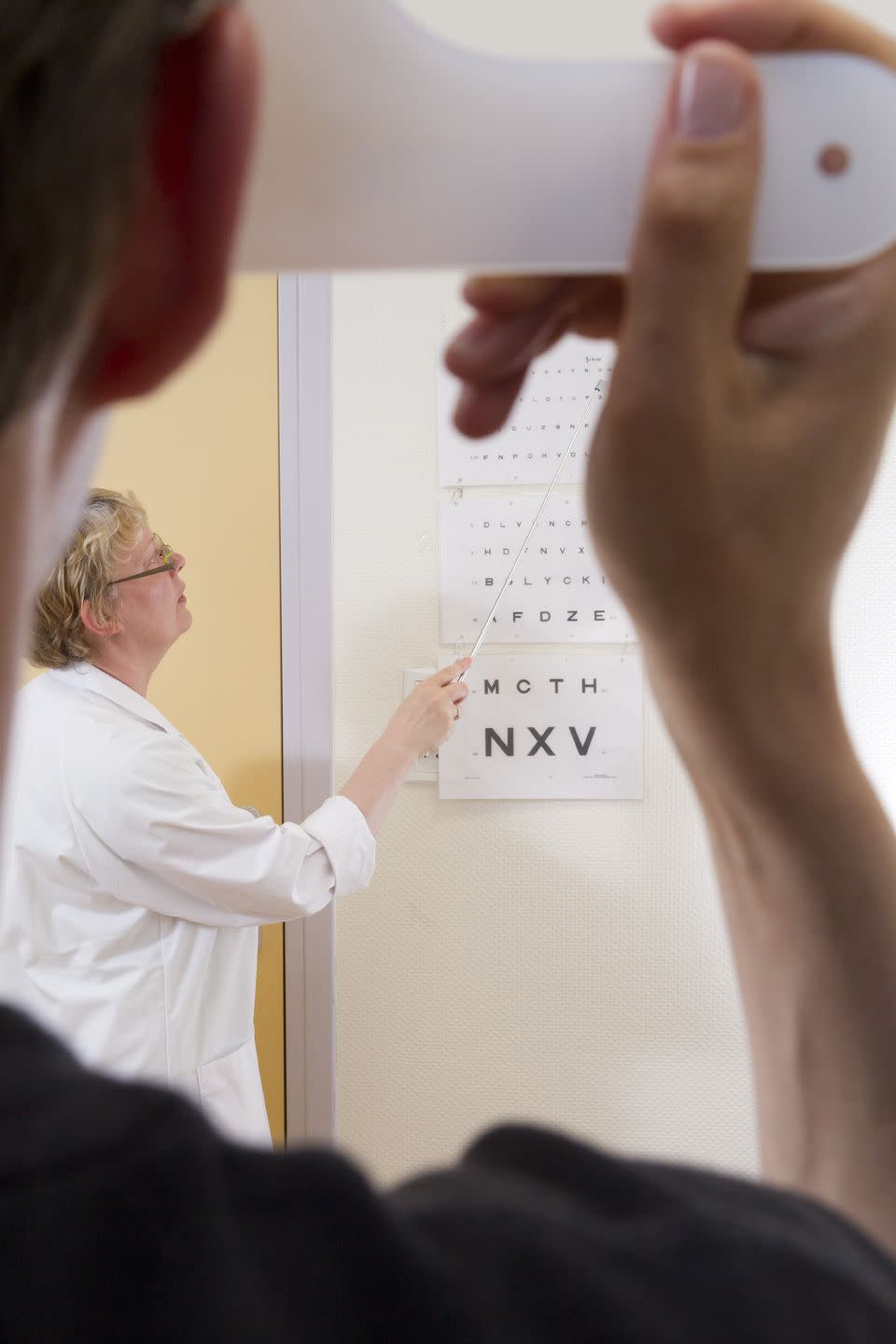My Mom Put Off Cataract Surgery: Here’s What You Need to Know

When my mom was scheduled for cataract surgery, all I knew was that she had trouble seeing and that she needed a ride home after the procedure. When she asked me to attend the pre-surgery appointment with her, I assumed that she just wanted an extra set of ears to help her remember the logistics of her surgery. But as the appointment went on, I was surprised to learn the severity of her cataract.
THE BASICS
According to the American Academy of Ophthalmology, a cataract causes the natural lens in your eye to become cloudy. A clear, healthy lens helps us see. The cloudy lens causes your vision to become blurry and hazy. The development of a cataract is usually attributed to aging, as normal eye changes start occurring at age 40 and intensifying over age 60.

Cataracts often grow slowly, so you may not even be aware of the progression. “Regular eye exams are important for all patients,” says Robert S. Bailey, Jr., MD, chief of cataract and primary eye care service, Wills Eye Hospital. “The frequency of exams increases as we get older. Vision problems may be caused by a more serious condition. Cataracts, glaucoma, and macular degeneration are the most common eye disorders as we age. These conditions are all amenable to treatment which can restore or at least prevent further vision loss.”
THE DAY OF
There are more than 2 million cataract surgeries performed in the United States each year. During cataract surgery, the natural, clouded lens is removed and replaced with an artificial lens. Doctors choose an appropriate lens based on pre-operative consultations. The procedure itself is usually painless. “Doctors educate their patients about what to expect on the day of surgery, as well as care for the eye after surgery,” says Bailey. “Usually patients have only mild irritation for a short time after surgery.”

THE WAITING GAME
Putting off cataract surgery isn’t always a bad idea. “It’s not a good idea to push surgery on someone if you feel that the patient is OK with their vision,” says Steven G. Safran, M.D., PA, an ophthalmologist, eye physician and surgeon who specializes in cataract surgery with premium lenses. “You might give them a problem they don’t have.”
Safran feels that most of the time when people delay surgery, it’s because they haven’t been examined by someone who would recommend it. “I see patients who really would have benefited had it been recommended. But then there are those who have surgery pushed onto them and I feel that they don’t need it. If someone is bothered by the quality of their vision and I feel that surgery is safe and will give them what they want, I think it would be good for them to know that it exists. If you take someone who can’t see and give them the gift of sight, that’s very different than someone who might not need it.”

POTENTIAL COMPLICATIONS
Cataracts remain the leading cause of blindness worldwide, according to the World Health Organization. My mom had almost no vision remaining in her right eye. According to my mom’s ophthalmologist, her cataract was very dense. Due to the complexity of her cataract, he recommended a laser procedure, which was not covered by insurance. “Some cataracts can become more dense or hard as they grow and the risk of complications during surgery can increase,” says Bailey.
Safran calls out to the importance of managing expectations that are realistic for the patient. “Patients will be unhappy if you promise more than what you can deliver,” he says. “Try to figure out what they’re unhappy with.” They should also be made aware of issues that are unrelated to the surgery, but may be discovered after surgery, like a retina problem. “Some patients develop dry eye and irritation that was present before, but wasn’t appropriately addressed,” says Safran. “Patients can also experience glare and halos depending on the type of lens that is replaced.” He also emphasizes the importance of a positive reputation and good rapport with your patients. Safran sees many patients who were referred to him for lens exchanges, which is an issue that can be corrected.

THE OUTCOME
Patients are generally back to normal activities immediately. “Vision is often improved very soon after surgery,” says Bailey. But the improvement time can vary, depending on the severity of the procedure. Patients will often see their ophthalmologist several times after the procedure to monitor the results and make any post-operative adjustments. Increased tears in the eye, irritation and a foreign body sensation are all common symptoms after surgery. According to Bailey, they are usually mild and short lived.
Patients who have surgery in one eye and have a large difference in the vision between the operated and un-operated eye can struggle. “This usually is most noticeable immediately after surgery,” says Bailey. “Most patients adjust to this difference quickly and are able to function.” Some patients may need to wear glasses after cataract surgery, which can be assessed with a vision exam.
FEAR OF SURGERY
Although cataract surgery is low risk, it isn’t no risk. Surgery can be frightening for anyone. In my mom’s case, her doctors did their due diligence in recommending the procedure. She knew that her vision was suffering, but still put off the surgery because she was afraid of complications. “We all have times where we feel anxious or uneasy about something,” says Barbara Cox, PhD, is a psychologist and author. “Fear is one of the body's built in emotions that nature set up to protect us. Sometimes however, the fear is unnecessarily evoked if we let our mind visualize a potential future danger that might not be real.”
Medical phobias affect a small percent of the population. Anxiety, on the other hand, refers to a generalized state of unease. It’s important to understand why someone is delaying medical treatment. “Is there past trauma associated in some way with medical care or with the illness or loss of a friend or loved one?” says Dr. Daniel Block, MD, a psychiatrist. “Exploring the cause of the fear can help the doctor to formulate a treatment plan. Therapy, often through cognitive-behavioral therapy, is a sound approach for dealing with anxiety and phobias. Sometimes medication may be necessary, whether on an as-needed basis right before an appointment, or on a regular basis if used to treat an underlying anxiety disorder. An evaluation with a psychiatrist can help make that determination.”

When the time comes for the procedure, Cox recommends having a list of positive or distracting activities to tackle if fearful thoughts creep up, like taking a short walk, meditating and deep breathing. Stacey B. Shapiro, a licensed clinical social worker, recommends bringing a friend or family member with you to the appointment to help distract you from the anxiety and feel their support. “Sometimes when we're anxious, we can’t remember clearly what the doctor said, so another set of ears is helpful,” says Shapiro.
Six months after her procedure, my mom is happy, healthy and seeing clearly. She regrets that she waited so long for the surgery. She’s much less anxious now and won’t be putting off surgery on the cataract in her left eye.
You Might Also Like

